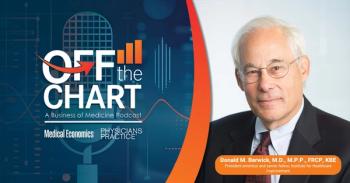
Physician Compensation Tied to Quality, Patient Metrics 'Growing'
While a new survey indicates that a small percentage of both primary care and specialist pay is tied to quality and patient metrics, it could be growing in the future.
For the first time in over 35 years of surveying physicians, the Medical Group Management Association (MGMA) included questions on quality and patient satisfaction metrics on its latest annual compensation survey, according to MGMA director of data solutions, Todd B. Evenson.
"Obviously, under the ACA and other value-based reimbursement that we see in the future, we'll see [quality metrics] as increasingly important components of physician compensation models," said Evanson. "So we felt that it was very important to begin that process to highlight how compensation plans are being changed based upon those changes to reimbursement models."
The "
While this number is relatively small, MGMA president and CEO, Susan L. Turney, MD, said in a statement, "It's encouraging to see physician practices invested in patient-centered care and continuing to seek ways to better incorporate quality and experience into compensation methodologies."
Mary Barber, vice president of physician recruitment and retention firm, Cejka Search, agrees.
"We do see signals that these components [patient satisfaction and quality measures] will be growing in significance and proportion to total compensation. Primary-care physicians will be positioned as the care quarterback for their patients from an outpatient basis. And, in fact, physicians are positioned to lead and their compensation will reflect that reality," said Barber in an e-mail to Physicians Practice.
In the Physician Retention Survey 2011, the American Medical Group Association and Cejka Search asked physicians "what minimum percentage of incentive compensation is required to drive desired changes in practice outcomes for [quality measures]." Fifty-one percent of respondents felt that 3 percent or 5 percent of incentive compensation was sufficient to drive quality measures in their practices.
Evenson noted that while practices are already moving in the direction of patient-centered care and reimbursement contingent on quality measures, e.g. PQRS and e-prescribing programs, very often they are limited by the amount of funds available for that purpose. However, through the expansion of government initiatives like the EHR Incentive Programs, physicians are being paid for meeting quality measures like meaningful use, which, he said, could help them expand their own quality programs.
So while these metrics directly affect physician compensation, it will be a practice-wide effort, added Evenson, driving stronger relationships between physicians and staff.
"The administrative and support staff team will have a larger role ultimately in delivering that satisfying experience for the patient," he said. "As a result, it will be critically important for the physician and the administrator to develop a stronger relationship to be successful at that."
The MGMA survey also reported that the growth of physician compensation was relatively flat during the period 2011-2012, with a modest 5.6 percent increase for select primary-care specialties. Annual median compensation in 2012 was reported for selected specialties.
• Family Practice (without OB/GYN) - $207,117
• Pediatric/Adolescent Medicine â $216,069
• Internal Medicine â $224,110
• Obstetrics/Gynecology â $301,737
• Cardiology Invasive â $532,269
Physicians Practice also recently asked physicians if they believe their pay should be more closely aligned with quality measures or patient satisfaction scores. What do you think?
Newsletter
Optimize your practice with the Physicians Practice newsletter, offering management pearls, leadership tips, and business strategies tailored for practice administrators and physicians of any specialty.






